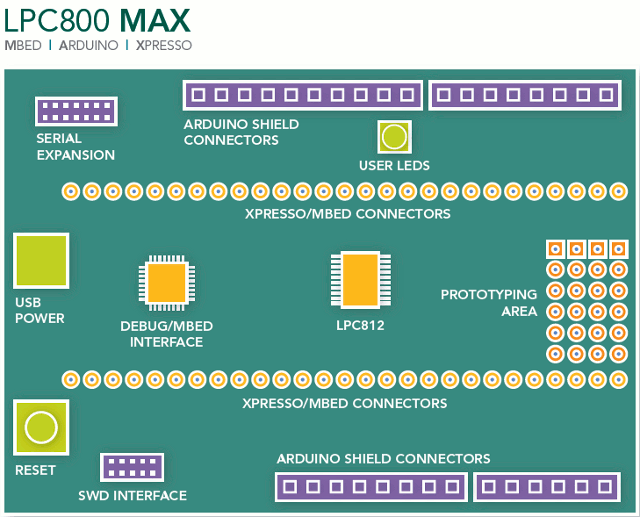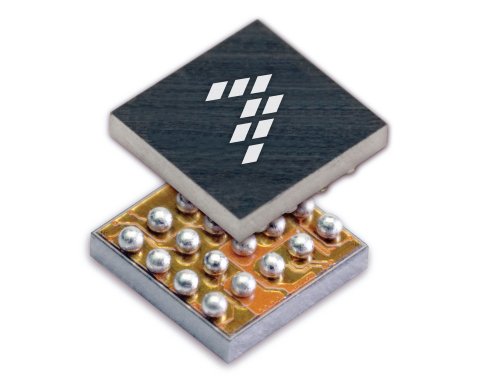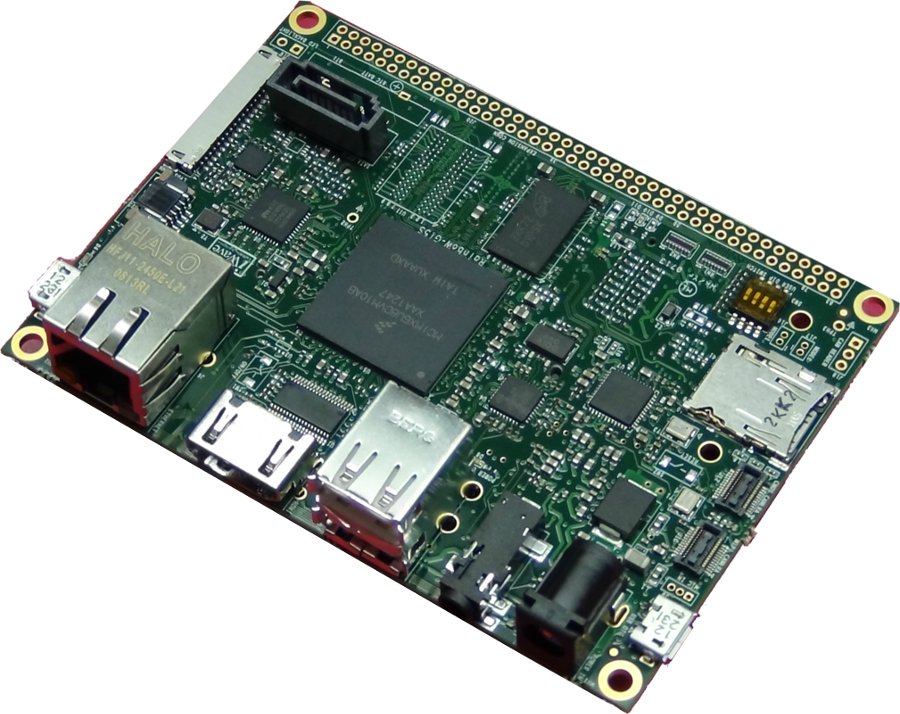NXP unveiled LPC810 & LPC812 Cortex M0+ MCUs in November 2012, and more recently at Embedded World 2013, the company announced LPC810 and LPC812 microcontrollers availability together with LPC800-MAX, a development board based on NXP LPC812 compatible with mbed, Arduino and LPCXpresso headers which will be released in April 2013. LPC800-MAX board features: MCU – LPC812 Cortex M0+ in TSSOP20 package Onchip memory – 4KB SRAM and 16KB Flash. On-board debug interface (mbed USB onboard interface) on a LPC11U35 Top of board has Arduino compatible connectors, bottom of board has mbed and LPCXpresso connectors. Routing configurable via Switch Matrix. 3 color user LED, same one as on the LPC800 Xpresso A PCF8591 I2C ADC, mainly intended for use with the Arduino connectors 14-pin Serial Expansion Interface Connector compatible with several expansion modules from Embedded Artists 10-pin SWD connector for optional external debug probe User prototyping area This USB powered board will […]
Freescale Unveils Kinetis KL02, an Ultra Small (1.9×2.0mm) ARM Cortex M0+ Microcontroller
Freescale Semiconductor introduced the Kinetis KL02, the world’s smallest ARM MCU, at Embedded World 2013. KL02 is an ARM Cortex M0+ micro-controller designed to address the miniaturization needs of the Internet of things, and its size (1.9×2.0mm) makes it suitable for applications such as ingestible healthcare sensing, portable consumer devices, remote sensing nodes, and wearable devices. Kinetis KL02 MCU features include: 48 MHz ARM Cortex-M0+ core, 1.71-3.6V operation Bit manipulation engine for faster, more code-efficient handling of peripheral registers 32 KB flash memory, 4 KB RAM High-speed 12-bit analog-to-digital converter High-speed analog comparator Low-power UART, SPI, 2x IICI2C Powerful timers for a broad range of applications including motor control Power Efficiency – 15.9 CM/mA (Coremark 1.0) -40 °C to +85 °C operation The MCU is manufactured using chip-scale package (CSP) technology that allows to connect the die directly to the solder ball interconnects and, in turn, to the printed […]
iWave Systems Announces RainboW-G15S Pico ITX Board Powered by Freescale i.MX6 Duallite/Solo Processor
iWave Systems has just launched the RainboW-G15S, a Pico ITX single board computer featuring Freescale i.MX 6 Solo and Dual Lite processor at Embedded World 2013, in Nuremberg, Germany. This embedded board targets intelligent industrial control systems, industrial human machine interface, ultra portable devices, home energy management systems, and portable medical devices. RainboW-GS15 Specifications: SoC – Freescale i.MX6 Dual Lite/Solo, (Quad /Dual compatible) System Memory – 512MB DDR3 (Expandable up to 2GB) Storage – On-board Micro SD slot, standard SD/SDIO slot, optional eMMC support, and an optional SATA 7-pin connector (Probably just to make the board pretty since i.MX6 Solo and Duallite do not support SATA…) Connectivity – 10/100/1000Mbps Ethernet USB – 2x USB Host Connector + micro USB OTG connector Misc – Half mini PCIe card connector, CAN Header Audio & Video interfaces: AC97 Audio Codec with Audio Out Jack & Audio In Header HDMI Port LVDS connector with […]
ISEE Introduces IGEP COM CYGNUS & AQUILA Powered by TI Sitara AM335x Processor
ISEE will officially launch and showcase 2 new computers-on-module at Embedded World 2013 on February 26-28, in Nuremberg, Germany: IGEP COM CYGNUS and IGEP COM AQUILA. Both CoM shares the same characteristics except the former is powered by TI Sitara AM3352 (Cortex A8, no GPU) and the later by TI Sitara AM3354 (Cortex A8 + PowerVR GPU). This makes the CYGNUS suited for cost sensitive applications such as industrial control, home automation, and test and measurement devices, and the AQUILA for applications that requires more advanced graphics and multimedia capabilities such as gaming, auto infotainment and navigation devices. The key specifications of the 2 modules are as follows: Processor – Texas instruments Sitara AM3352 Cortex A8 @ 720 Mhz (CYGNUS) and AM3354 Cortex A8 @ 720 Mhz + PowerVR SGX GPU (AQUALIA) System memory – 256 MB DDR3 SDRAM, 303 MHz, 16-bit Storage – 128 MB SLC NAND FLASH + […]






